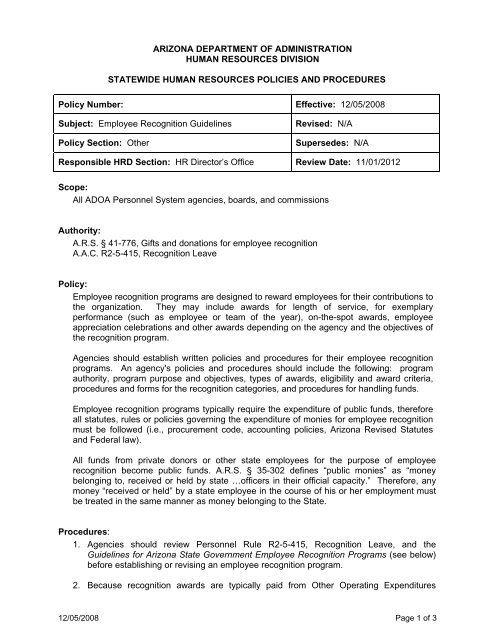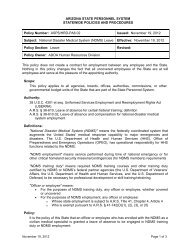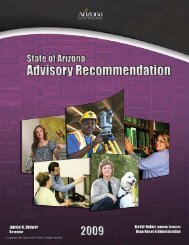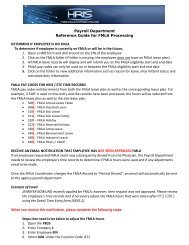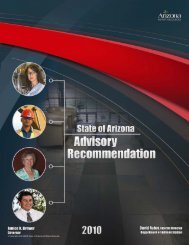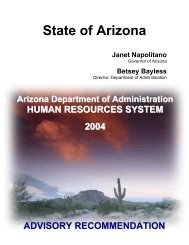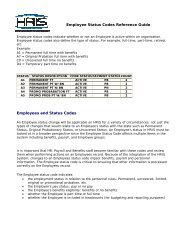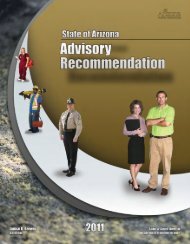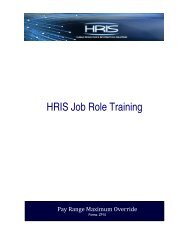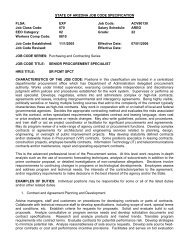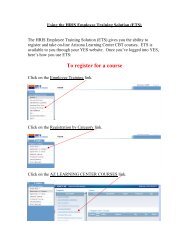arizona department of administration - Arizona Human Resources
arizona department of administration - Arizona Human Resources
arizona department of administration - Arizona Human Resources
You also want an ePaper? Increase the reach of your titles
YUMPU automatically turns print PDFs into web optimized ePapers that Google loves.
ARIZONA DEPARTMENT OF ADMINISTRATION<br />
HUMAN RESOURCES DIVISION<br />
STATEWIDE HUMAN RESOURCES POLICIES AND PROCEDURES<br />
Policy Number: Effective: 12/05/2008<br />
Subject: Employee Recognition Guidelines<br />
Policy Section: Other<br />
Revised: N/A<br />
Supersedes: N/A<br />
Responsible HRD Section: HR Director’s Office Review Date: 11/01/2012<br />
Scope:<br />
All ADOA Personnel System agencies, boards, and commissions<br />
Authority:<br />
A.R.S. § 41-776, Gifts and donations for employee recognition<br />
A.A.C. R2-5-415, Recognition Leave<br />
Policy:<br />
Employee recognition programs are designed to reward employees for their contributions to<br />
the organization. They may include awards for length <strong>of</strong> service, for exemplary<br />
performance (such as employee or team <strong>of</strong> the year), on-the-spot awards, employee<br />
appreciation celebrations and other awards depending on the agency and the objectives <strong>of</strong><br />
the recognition program.<br />
Agencies should establish written policies and procedures for their employee recognition<br />
programs. An agency's policies and procedures should include the following: program<br />
authority, program purpose and objectives, types <strong>of</strong> awards, eligibility and award criteria,<br />
procedures and forms for the recognition categories, and procedures for handling funds.<br />
Employee recognition programs typically require the expenditure <strong>of</strong> public funds, therefore<br />
all statutes, rules or policies governing the expenditure <strong>of</strong> monies for employee recognition<br />
must be followed (i.e., procurement code, accounting policies, <strong>Arizona</strong> Revised Statutes<br />
and Federal law).<br />
All funds from private donors or other state employees for the purpose <strong>of</strong> employee<br />
recognition become public funds. A.R.S. § 35-302 defines “public monies” as “money<br />
belonging to, received or held by state …<strong>of</strong>ficers in their <strong>of</strong>ficial capacity.” Therefore, any<br />
money “received or held” by a state employee in the course <strong>of</strong> his or her employment must<br />
be treated in the same manner as money belonging to the State.<br />
Procedures:<br />
1. Agencies should review Personnel Rule R2-5-415, Recognition Leave, and the<br />
Guidelines for <strong>Arizona</strong> State Government Employee Recognition Programs (see below)<br />
before establishing or revising an employee recognition program.<br />
2. Because recognition awards are typically paid from Other Operating Expenditures<br />
12/05/2008 Page 1 <strong>of</strong> 3
Statewide <strong>Human</strong> <strong>Resources</strong> Policies and Procedures<br />
Subject: Employee Recognition Guidelines<br />
(OOE), this should be considered when the agency budgets and allocates funds.<br />
Common types <strong>of</strong> recognition expenses funded from Other Operating Expenditures<br />
(OOE) include:<br />
• Awards (length <strong>of</strong> service, on-the-spot, etc.)<br />
• Printing <strong>of</strong> brochures, flyers, newsletters and other related marketing and<br />
communication materials<br />
• Photo processing<br />
3. In order for awards not to be considered additional wages to the employee and subject<br />
to tax withholding:<br />
• Awards that can be easily converted to cash (pawned), tickets for entertainment,<br />
kachina dolls, jewelry (except jewelry bearing agency logo), tickets (e.g. cruise,<br />
airline) or any other item which can be turned into cash should not be<br />
considered.<br />
• An award given to an employee for length <strong>of</strong> service must be awarded under<br />
circumstances that do not indicate that the payment is disguised compensation,<br />
and generally should not exceed $100. It is appropriate for the value <strong>of</strong> the<br />
award to increase as the employee’s years <strong>of</strong> service increase. An award valued<br />
at $100 might be given to an employee reaching a 30 or 35 year milestone. If<br />
your agency is contemplating substantially exceeding this recommended level,<br />
please consult with the Attorney General’s Office. Length <strong>of</strong> service awards<br />
should be given at a minimum in five year intervals (5, 10, 15, 20, etc.).<br />
• Awards for on-the-spot, noteworthy performance and other types <strong>of</strong> recognition<br />
programs (i.e. public service, pr<strong>of</strong>essional achievement, retirement) should be<br />
limited to such items as plaques, certificates, reserved parking spaces,<br />
recognition leave, or work-related items (i.e. pens/pencil sets, calculators,<br />
portfolios). These awards provide a benefit by encouraging efficiency and<br />
building morale. The value <strong>of</strong> this benefit should not be exceeded by the<br />
expenditure <strong>of</strong> public funds. It is recommended that awards for on-the-spot<br />
generally do not exceed $25 and awards for noteworthy performance and other<br />
types <strong>of</strong> recognition programs generally do not exceed $75. If your agency is<br />
contemplating substantially exceeding this recommended level, please consult<br />
with the Attorney General’s Office.<br />
• All dollar amounts listed herein should be considered on a calendar year basis.<br />
• All dollar amounts listed herein are specified to ensure that the value <strong>of</strong> the<br />
awards is not disproportionate to the value that the public derives from the<br />
agency giving such awards.<br />
4. Unless the agency has been given specific authority (legislative, federal, contract,<br />
grants), appropriated and non-appropriated funds should not be used to pay for food<br />
and beverages.<br />
5. Agencies can raise funds from private donors or other state employees for the purpose<br />
<strong>of</strong> employee recognition events (including food and beverages) if:<br />
• The agency establishes an Employee Recognition Fund, in conjunction with the<br />
General Accounting Office, where all donated funds will be deposited with the<br />
state treasurer; implements policy and procedures; designates a person<br />
responsible for administering and approving expenditures from the funds; and,<br />
separately accounts for and reconciles the financial activities <strong>of</strong> the employee<br />
recognition program. Funds raised for employee recognition programs must be<br />
used only for employee recognition purposes.<br />
• The funds solicited or accepted by a state employee representing the agency<br />
12/05/2008 Page 2 <strong>of</strong> 3
Statewide <strong>Human</strong> <strong>Resources</strong> Policies and Procedures<br />
Subject: Employee Recognition Guidelines<br />
are not given as a gift, gratuity, favor, entertainment or loan which is, or may<br />
appear to be designed to influence the employee’s <strong>of</strong>ficial conduct. (For<br />
example, employees working at the Department <strong>of</strong> Revenue who are<br />
responsible for determining the tax liability <strong>of</strong> restaurants should not solicit or<br />
accept gift certificates from any restaurant. Similarly, employees working with a<br />
construction company to build a prison for the state should not solicit or accept a<br />
cash contribution from the contractor.)<br />
• The donor (i.e. local businesses, state employees) and the agency agree that<br />
the funds will be used for employee recognition.<br />
Note: If a local business contributes a cash contribution, the donor should<br />
sign a notice acknowledging their understanding that the donation will be<br />
used only for employee recognition purposes. Agencies using donated funds<br />
for an employee recognition event should ensure that the value received by<br />
the public from the employee recognition event is greater than the cost <strong>of</strong> the<br />
event. Perceived value vs. cost is <strong>of</strong>ten difficult to prove, therefore, agencies<br />
are encouraged to err on the conservative side.<br />
For events where state employees are encouraged to participate, such as bake<br />
sales, silent auctions, etc., a notice should be posted that all proceeds will be<br />
used for employee recognition purposes. If items for events were purchased by<br />
employees with their own monies and it is necessary to reimburse them, a<br />
notice should be posted that all pr<strong>of</strong>its will be used for employee recognition<br />
purposes. For example, if an employee purchases the root beer and ice cream<br />
with his/her own money that will in turn be used in a root beer float sale, the<br />
employee can be reimbursed for his/her expenses using the money raised from<br />
the sale and the remaining pr<strong>of</strong>its would be used for future employee recognition<br />
purposes.<br />
6. Prior to awarding recognition leave, an agency is required to develop an employee<br />
recognition leave program in accordance with Personnel Rule R2-5-415.<br />
Related Form(s)/Link(s):<br />
Guidelines for <strong>Arizona</strong> State Government Employee Recognition Programs<br />
Corresponding Policy(ies):<br />
GAO Technical Bulletin No. 00-1, Guidelines for Establishing and Accounting for Employee<br />
Recognition Programs Funded by Donations or Fund Raising Activities<br />
Contact:<br />
If you have any questions related to HR Policy, please contact your agency’s <strong>Human</strong><br />
<strong>Resources</strong> Office/representative.<br />
Policy History (supersedes):<br />
Not applicable<br />
12/05/2008 Page 3 <strong>of</strong> 3


